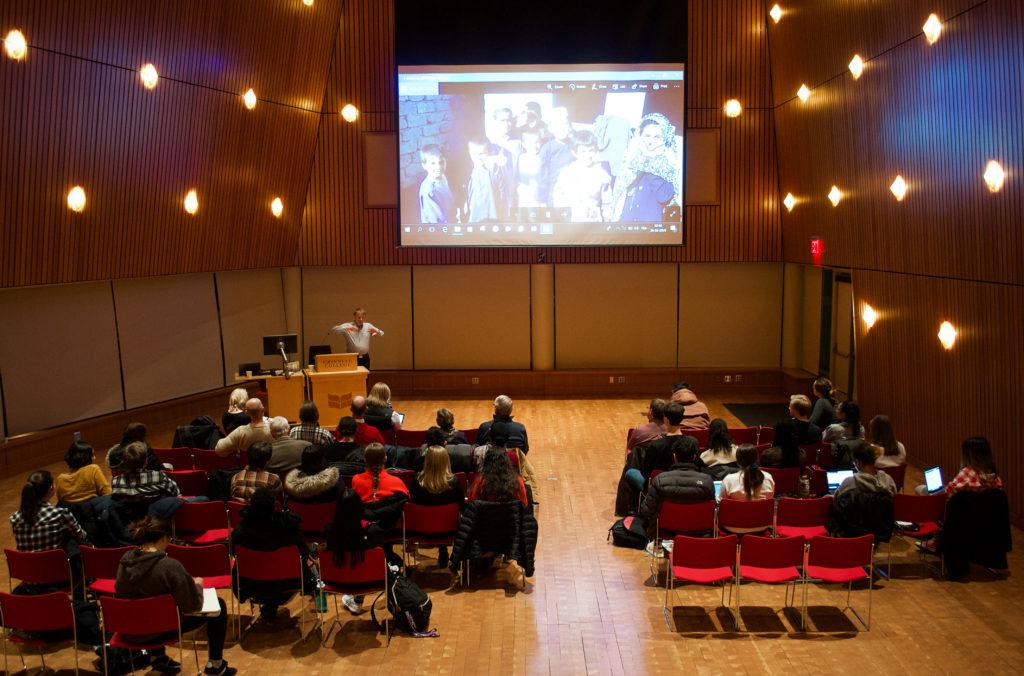Between imposition and self-sovereignty, as well as temporary help and long-term development, humanitarian aid treads critical lines in response to international crises. On Monday evening, European Union official Alfred Foehr visited campus to speak about his work in on-the-ground implementation of aid efforts in Afghanistan, a setting of intensifying insecurity and conflict. The Rosenfield Program organized the event as part of Grinnell’s Humanitarian Aid Symposium.
Since 2003, Foehr has worked with the European Civil Protection and Humanitarian Aid Operations (ECHO), the European Commission’s department for overseas humanitarian aid and civil protection. He is currently the director of ECHO’s operations in Afghanistan. Working closely with NGOs, the U.N. and international partner organizations, ECHO funds and oversees emergency assistance to populations with the most extreme vulnerability. The commission has been one of the largest contributors of aid to Afghanistan since 2002. It is also currently active in sub-Saharan Africa, Haiti, South America and other regions of the Middle East.
Foehr said, “We are one of the very few offices in the European Commission which can react really quickly, because if you do humanitarian aid, you’re addressing immediate and acute humanitarian needs.”
He added, “If you have the earthquake coming… or you have the sudden influx of migrants from Myanmar to Bangladesh, you have to react quickly. So here we really have this privilege … to [do so]. It’s quite unique if you know how big international bodies work.”
Much of ECHO’s work in Afghanistan has been in response to the enduring drought in the Northwest part of the country, which devastated crop yields and forced thousands to move into cities. Civil conflict is also an ever-present danger to human safety. The commission provides assistance through food, healthcare, shelter, monetary aid to families and basic education for children.
Foehr emphasized, however, the temporary nature of ECHO’s emergency assistance: “Conceptually, we would not like to stay forever; we would like to help, do the humanitarian work, and then hopefully at a certain stage, [the DirectorateGeneral for International Cooperation and] Development or the national government would take over.”
This impermanence is at the core of humanitarian aid’s complexity. Limited by time-frame and political reach, relief organizations such as ECHO maintain a certain type of distance from the solutions to the human suffering they mitigate. An interesting balance, and topic of public discourse, is how closely involved these organizations can be to the issues which they are on the ground experiencing, and the people whom they directly help.
Mary DaVega ’21 said “In general they didn’t want to get involved in the government and politics at all, which kind of makes sense with how that can cause a lot of chaos and conflict, but at the same time, I feel like both kind of go hand and hand and it’s hard to make any sort of difference without coordinating with [a country’s] government.”
In this way, the talk evoked discussion on the ethicality of humanitarian aid.
“[Foehr] demonstrated how humanitarian aid organizations like ECHO that are … insisting on being apolitical and neutral actors as they serve [people] who are bearing the brunt of the failures of political actions or inactions can be ineffective at the least and at worst irresponsible,” Farah Omer ’19 wrote in an email to The S&B.
Another student, Peony Teo ’21, also expressed questions about the connection between emergency aid and broader, more permanent efforts: “He said humanitarian organizations are trying to work with development organizations, but how so?”
One of the greatest humanitarian concerns presented at the talk was the prevalence of internally displaced populations (IDP’s), and refugees from other countries. Today, over 30 percent of Afghanistan’s population is affected by drought, and four million people are food insecure. The human displacement to which ECHO responded in the Northwest is a sign of a problem which will manifest increasingly markedly in the future; as climate change escalates, food and water insecurity will affect even more people, and climate refugees will constitute a greater percentage of those displaced.
Foehr discussed the need for timely coordination with local organizations, development efforts, and the Office of the United Nations High Commissioner for Human Rights to address human needs in a way which would prevent sustained states of crisis. He also indicated policymaking bodies of the EU which engage with climate policy, for example. Additionally, he stressed the need for governmental action in order to increase stability and safety.
Barbara Trish, director of the Rosenfield Program and professor of political science, wrote in an email to The S&B, “International relations and human rights is part of the Rosenfield mission, at it seems that this speaker was able to intersect with those mission areas in a number of different ways.”
Foehr discussed the European Commission’s role to promote the protection of human rights law between warring parties. He indicated education as an area of increasing priority in these efforts–particularly the education of girls. ECHO has made strides to promote the implementation throughout the international community of basic education in areas of conflict, giving more and more girls access to an opportunity which they likely would not have otherwise. “We consider that a success,” he said.
Foehr ended by looking to the future of Afghanistan, and the politics upon which it rests.
“Much will depend on elections and what will come out of it [which is] very difficult to predict. … One thing is certain: even if we get a peace deal and even if it is a good peace deal, the humanitarian need in Afghanistan will remain for a long period of time. What we need is a rather competent government, an accepted government, which would bring some structure in the country, and … stability and safety, which would bring economic development. That is what we would like to see, and would like to achieve.”




















































